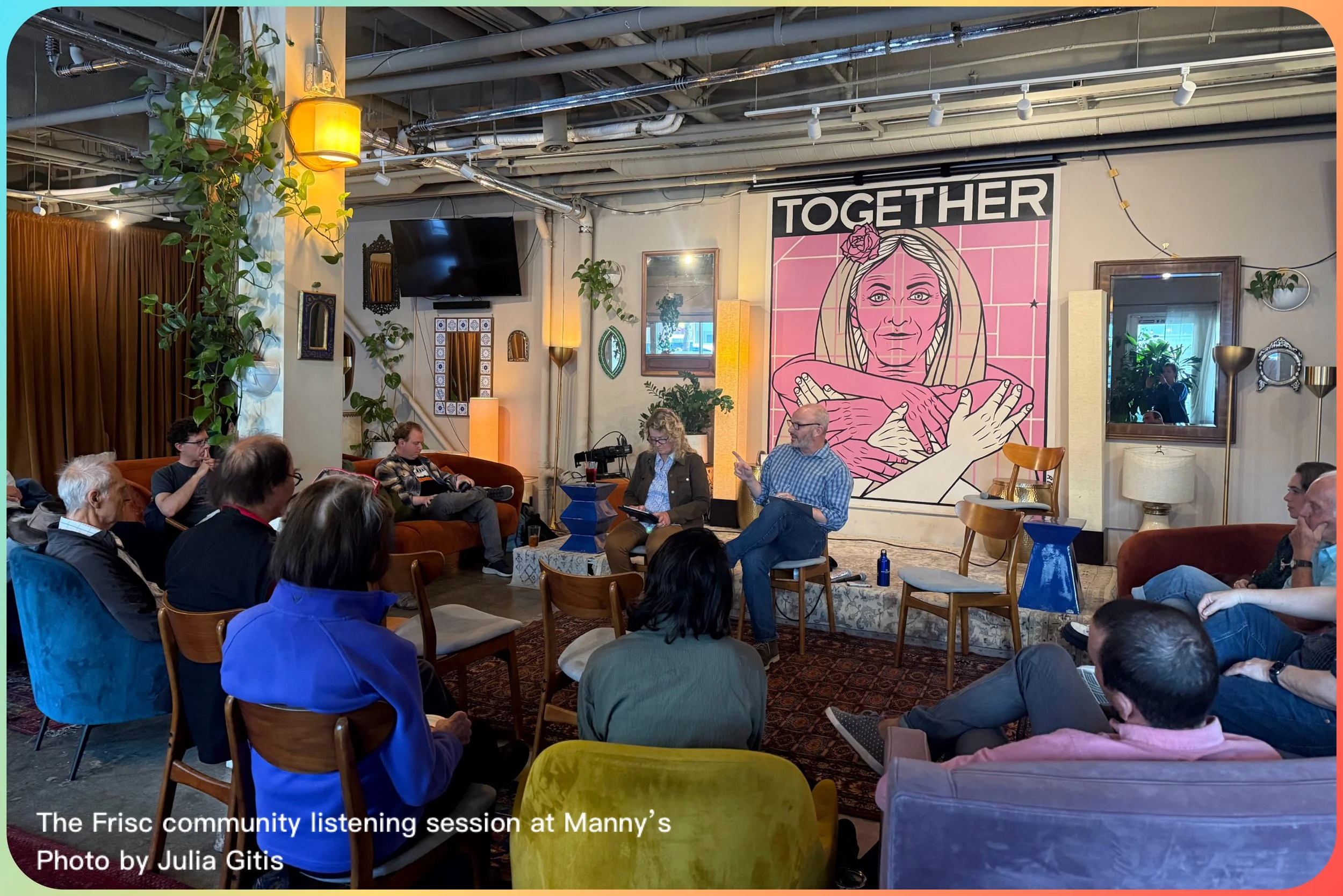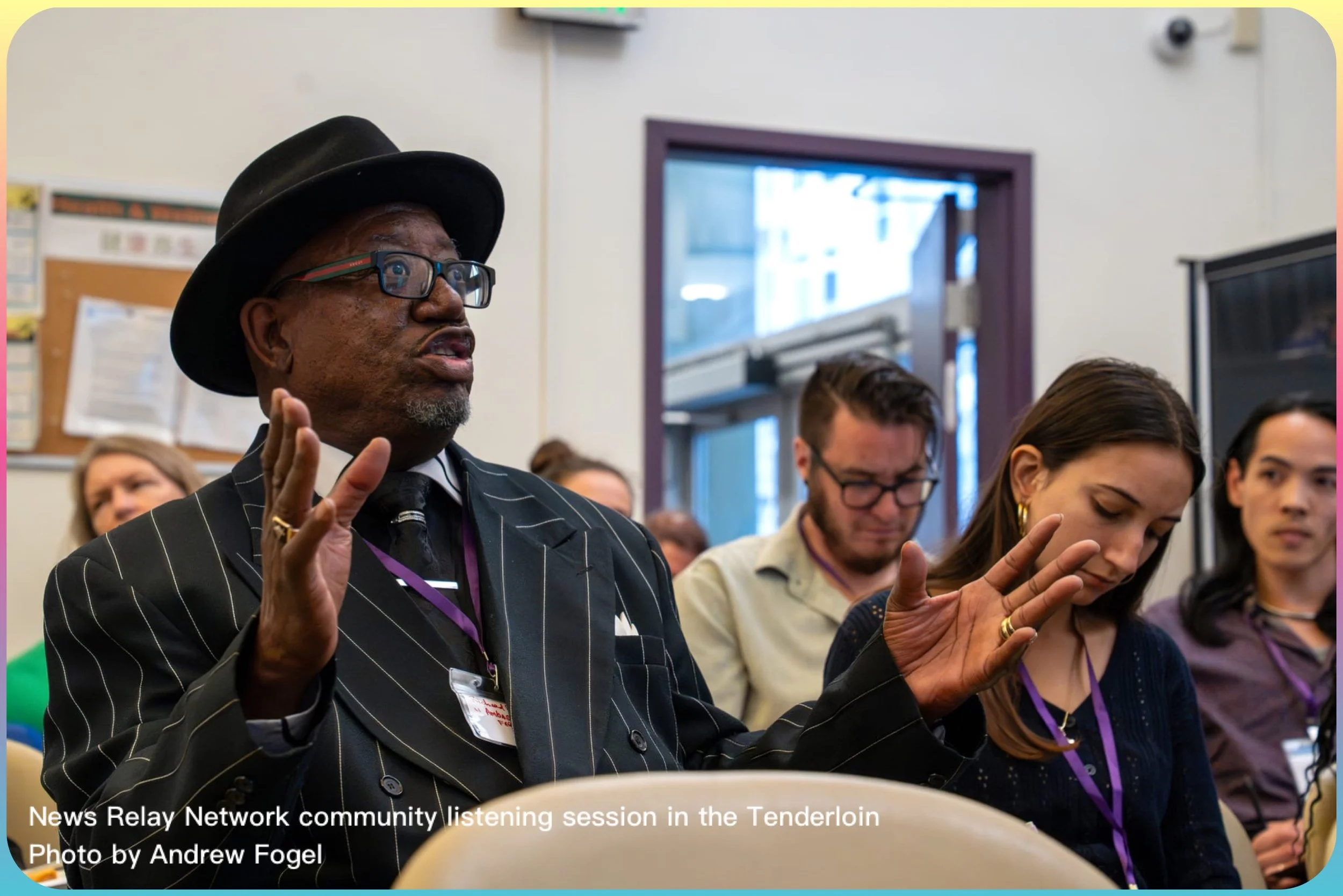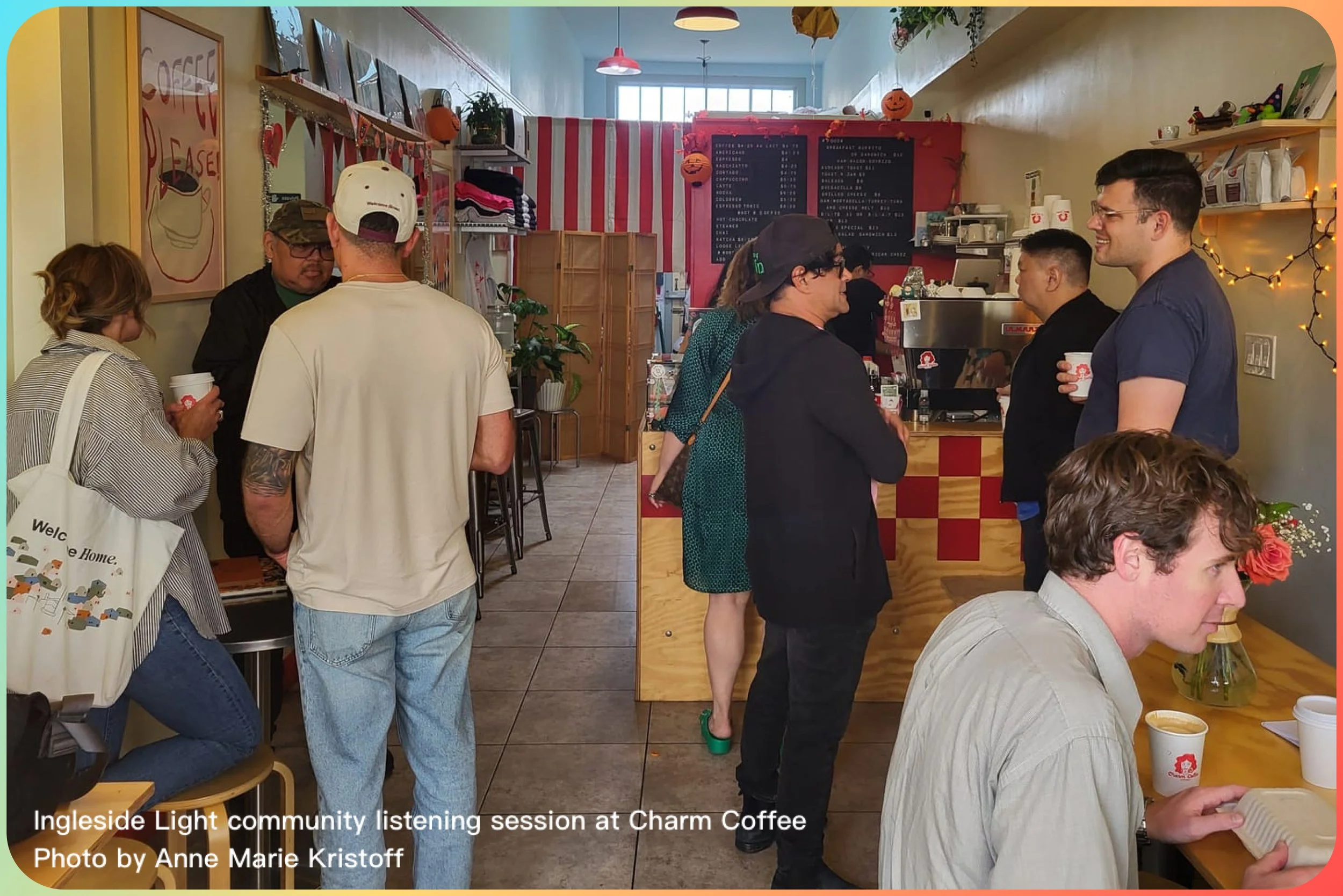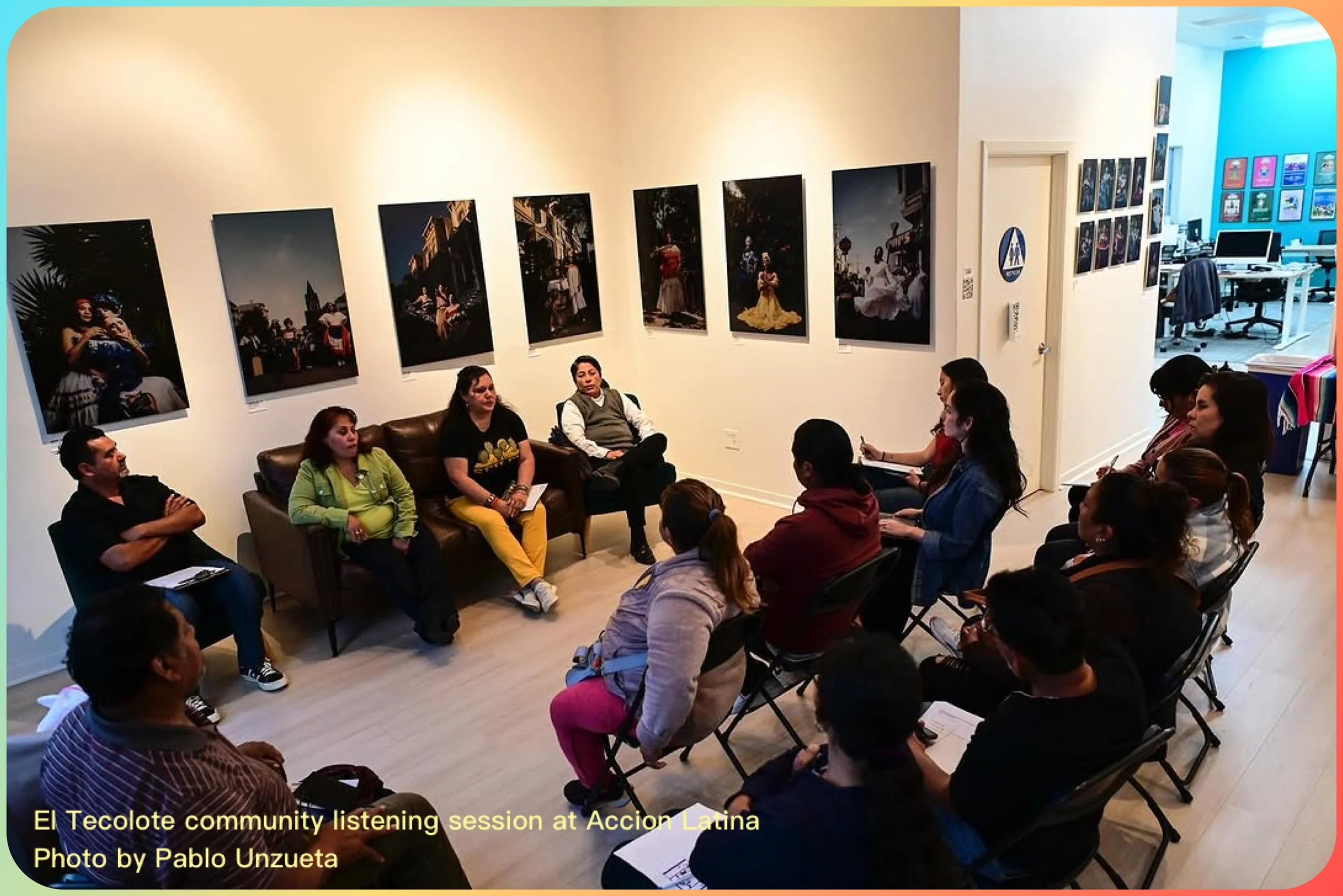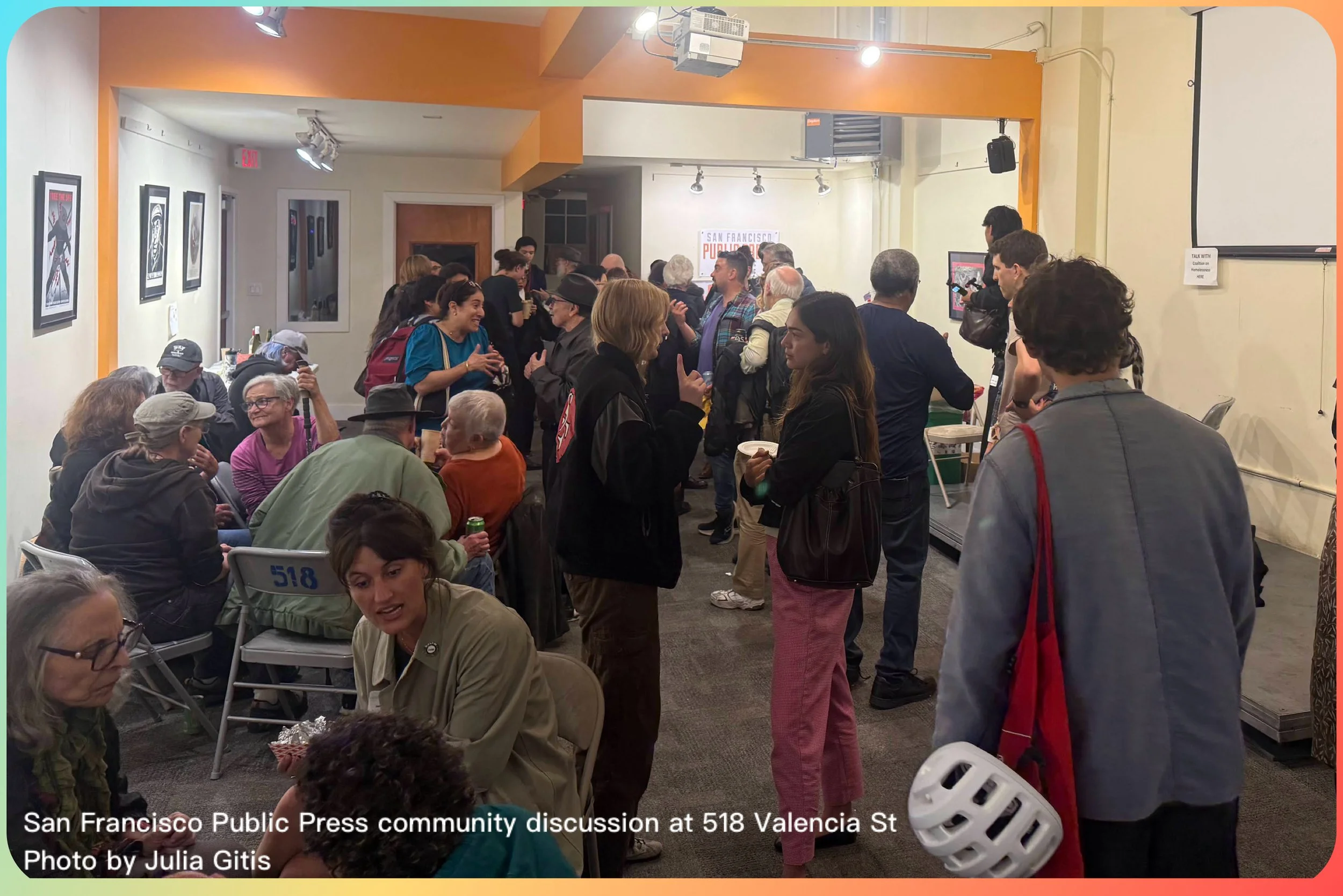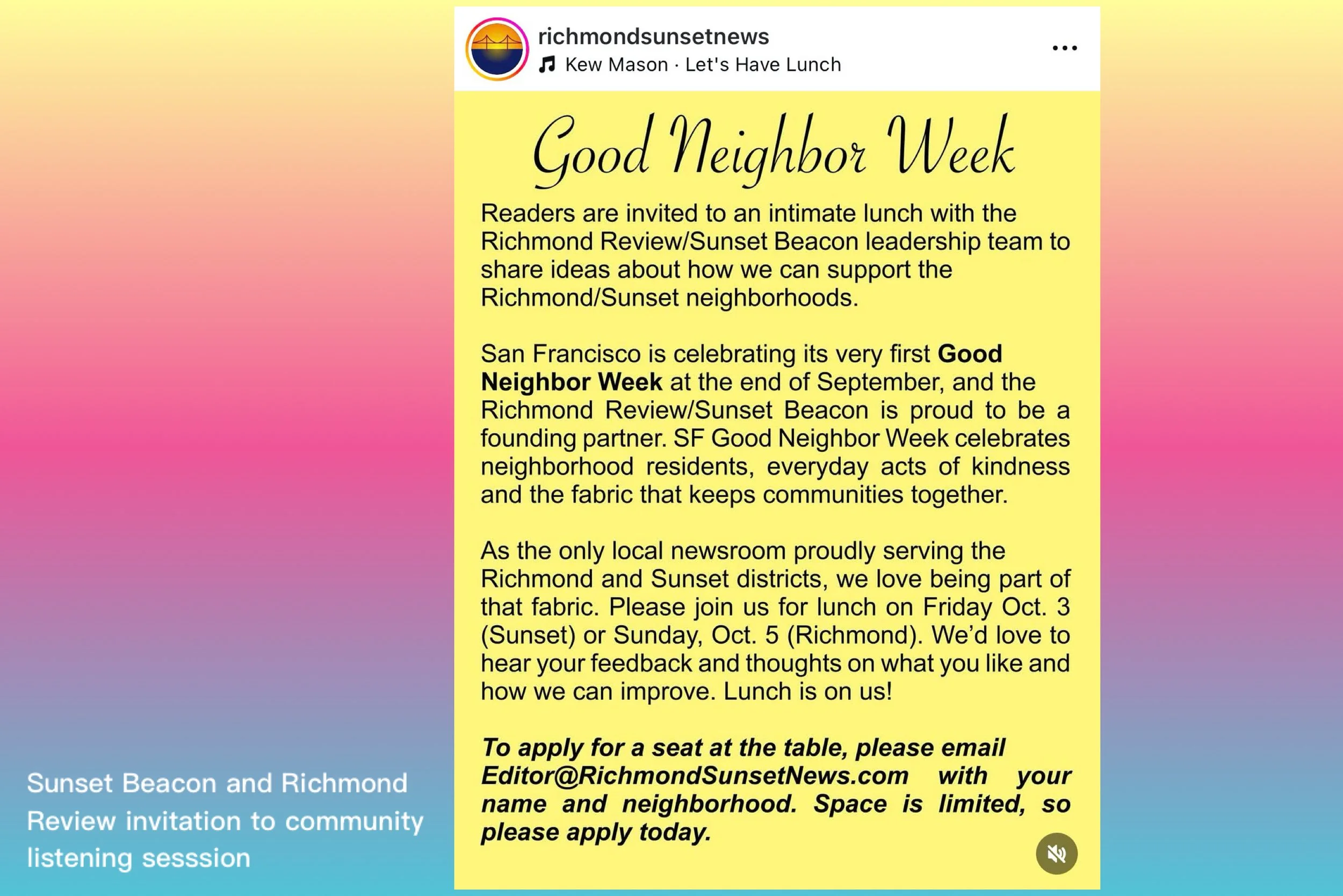Six San Francisco Newsrooms Host Community Listening Sessions During Inaugural SF Good Neighbor Week
This is the first post in a series of reflections on San Francisco’s inaugural SF Good Neighbor Week, Sep 27- Oct 5, 2025.
Background
When I launched the inaugural SF Good Neighbor Week in 2025, I knew I wanted local newsrooms involved. Though I don’t have a journalism background, I’ve been an advocate for local news in San Francisco—serving on the board of the San Francisco Press Club, being on the leadership team of the Bay Area Independent Community Media Coalition, and founding Community News Lab to elevate the visibility of local journalism. With SF Good Neighbor Week, I saw an opportunity for my local newsroom buddies to both participate and bring something special to the holiday.
“Good Neighbor Week demonstrates an accessibility of local newsrooms that people may not assume exists.”
San Francisco is the first city in the country to put concerted effort into having local newsrooms participate in celebrations of the holiday. National Good Neighbor Day, organized by the Hopeful Neighborhood Project, provides helpful guides for conducting outreach to various groups, including libraries and neighborhood associations. However, there isn’t a guide specifically for outreach to local papers. Some of the National Good Neighbor Day material does mention local newspapers, so I at least knew I wasn’t totally off base in making the connection. For example, in the guide for coffee shops, cafe owners are encouraged to have local newspapers available for customers. And in the suggestions for putting together a New Neighbor Welcome Kit, they suggest including a copy of the local paper. But aside from promoting the local paper, how can someone organizing SF Good Neighbor Week reach out to local newsrooms and ask them to participate? What could or should local newsrooms do during SF Good Neighbor Week? Answering those questions was up to me.
I can’t pinpoint exactly how I came up with the idea of using SF Good Neighbor Week for community listening sessions, but here are five experiences that likely shaped my instinct:
I’ve been hosting Neighborhood Feedback Days in partnership with local newsrooms for several years.
As a reader, I supported the 2024 San Francisco community information needs assessment conducted by Common Cause– and I recognize that it just scratches the surface of what communities really need, especially in our hyperlocal news deserts.
I’ve been inspired by newsrooms in other parts of the country, like the Jersey Bee, whose coverage is genuinely driven by community needs,
I’ve observed that, despite being interested and open to input, many newsrooms in San Francisco don’t spend much time getting community feedback on their coverage, tone, or user interface.
My vision for SF Good Neighbor Week is that it strengthens relationships not just between neighbors but also between residents and local civic institutions. To me, local newsrooms are civic institutions on the same level as schools, libraries, and parks.
Given these five dimensions, it’s probably not surprising that I see SF Good Neighbor Week as an opportunity to bring local newsrooms into conversation with everyday residents.
Reaching out
When I initially reached out to local newsrooms, I explained that it was San Francisco’s first time participating in this national holiday and asked if they were interested in being founding newsroom partners by hosting community listening sessions during the inaugural SF Good Neighbor Week. I offered that– if they host a neighborhood listening session over lunch with folks in the neighborhood to get feedback on their reporting– I’d pay for lunch. (I got a little bit of grant money over the summer, and this felt like a meaningful way to use it). Different newsrooms responded differently; some had hosted similar events before and jumped at the opportunity to do something quick and casual, some weren’t sure how to approach it and needed more guidance, and some took advantage of the opportunity to host a unique event or expand an event they were already planning.
I reached out to a number of local newsrooms in the city. In the end, six local newsrooms hosted community listening sessions during SF Good Neighbor Week, Sep 27 - Oct 5. Three newsrooms (El Tecolote, The Frisc, and San Francisco Public Press) hosted events in the Mission, Sunset Beacon hosted a lunch in the Sunset, News Relay Network hosted a listening session in the Tenderloin, and Ingleside Light hosted a coffee hour in Ingleside. A few other newsrooms wanted to participate but either didn’t have the bandwidth or couldn’t get enough RSVPs. We’ll try again next year!
After Good Neighbor Week, I followed up with the six founding newsroom partners to understand what they gained from the experience and how we can improve the process for next year. All six thought it was worth their time and want to do it again next year (or sooner!). They emphasized the importance of hosting in-person events, bringing the community together (including community leaders and community organizations), and hearing different viewpoints.
How it went
El Tecolote hosted a community listening session at the Accion Latina headquarters in the heart of the Mission (they posted some photos of their event on social media). Erika Carlos, Editor in Chief of El Tecolote, talks about how the event grew beyond what she planned. “It went really well. I initially planned it to be a smaller group with community leaders and day laborers, but they were saying, let’s invite folks. The guy who heads the street vendor association invited the street vendors, so other people from the community came. It was great, it helped us connect with other orgs we’ve been wanting to partner more with.” Erika also shared with me how the discussion topics grew to accommodate community interest. “The intention was to discuss what our emergency response system looks like. People were really just asking questions. It felt more like a community forum. They were telling the organizations present that it’s sometimes hard to know what their services are.”
Erika is excited to do more in-person events. “The community asked us to keep having forums like this. Having a space where you can literally go and ask questions face to face and hearing from lawyers themselves, like ‘these are your rights.’ Now Mission Action wants to do another event next month. They see that people are actually coming. We’ll do one focused on mental health, more family oriented. The immigrant women’s choir will perform.”
San Francisco Public Press already had an event planned that coincidentally fell during SF Good Neighbor Week, a film screening and panel at the Roxie about older adult homelessness. When I approached them about partnering for SF Good Neighbor Week, they decided to expand on their event by hosting a community discussion after the panel. They promoted the discussion with the message: “Join us around the corner at 8pm for refreshments and a meet-and-greet-listen-share gathering for Good Neighbor Week. Reporters from the San Francisco Public Press and Street Sheet want to listen to your concerns and ideas about homelessness.” The event was hugely successful, with over 60 people attending and engaging in community discussions. When I asked Lisa Rudman, the event organizer, what San Francisco Public Press got out of it, she spoke first about the promotional help from SF Good Neighbor Week. “First and foremost, we benefited from the partnership, by you amplifying the outreach and publicity. That was amazing. We feel we are good neighbors, but being part of it and participating, other people see us that way too.”
To help facilitate the community discussion, San Francisco Public Press placed different signs on the walls of the venue, each sign positioned next to a cluster of chairs to guide the discussion topic in that area. Lisa said “With our attempts to have signs on the wall to focus discussions, there were discussions that were specifically leading from the film and the panel. It was an experiment to do it loosely. The fact that it was unstructured allowed for a different texture of connecting.”
Like Erika, Lisa shared the value of having community leaders and community organizations be present, such as the Coalition on Homelessness. “Having that intentional interchange– not just with community members and our media outlet, but with frontline practitioners and people with direct experience, and advocacy groups that serve them– I’m happy and excited to be intentional about that combination. Participation of the community groups is part of this reciprocal relationship and a non-extractive relationship between journalists and the communities. At the end of the day it’s doing something different from just saying we want to build relationships with community members, but not just stick a mic and a notepad in front of them. It's a slow cooking, real relationship. We show up for them, they show up for us. It’s hard, but anything worth doing is labor intensive.”
The Frisc hosted a community listening session on the topic of streets and transit. They had great turnout at Manny’s in the Mission. Editor Alex Lash and reporter Kristi Coale facilitated a productive conversation with residents who expressed very different views on transit. When I asked Alex Lash, the founder and publisher of the Frisc, what he got out of the session, he described the importance of hosting events like this. “Anything for community building. I thought it was great and it has me thinking about doing more regular and similar things, like smaller listening sessions where you convene people and hear them out. It’s good for us and helps us strengthen our coverage.” Alex is also grateful for the nuanced viewpoints: “There were some usual suspects who showed up. The outspoken advocates were there. But what was good to hear was the nuance. Yes there are people on either side, but it was good to hear the folks in the middle who are still puzzling through this. And that’s really the readership that we want to reach. The ones who are like, help me understand this better… I kind of see both sides, help me figure this out.”
Ingleside Light published a story about their event, The Ingleside Light Hosts SF Good Neighbor Week Coffee Hour. Their event at a local coffee shop brought together neighborhood residents who got to talk about different topics together— both things they agreed on, like favorite restaurants, and things they disagreed on, like local real estate decisions. When I asked Alex Mullaney, founder and publisher of the Ingleside Light, what he got out of it, he reflected on three things: first and foremost, the importance of hosting events: “It was a rekindling of the importance of doing events. Just doing them, period. The value that everyone expressed that they got out of it was pretty big.” Secondly, Alex emphasized the feeling of community. “They all felt it was so nice to have community. A lot of them are older folks who don’t feel they can get involved in the neighborhood in a low barrier way. There’s also the good vibe of just Good Neighbor. Everyone can celebrate it. It’s pretty simple.” And lastly, Alex shared that he learned more about his audience. “People who we’ve never come across before, they had some ideas. It changes our coverage area– there's a lot of people who don't live in Ingleside who read it.” Lisa also spoke about the benefit of meeting readers for the first time. “A woman from the League of Women Voters wrote to me asking to do more in-person events. She's been on our newsletter list for years and I didn’t know her. We’ve got a lot of people on the newsletter but then they show up and they’re like a real person, and one thing leads to another. She’s been there all along.”
Sunset Beacon, beloved neighborhood paper of the westside, hosted a lunch gathering at a local diner. Community members gathered and discussed what they appreciated about the paper, as well as topics that are important to them, like senior services. They also agreed on the importance of continuing to have a print publication. Michael Durand, editor of the Sunset Beacon, shared “Being in the newspaper business is like being alone in a closet. You rarely get direct feedback from your customers. It reaffirmed that people really appreciate the paper. It keeps you going, it motivates you. It reaffirms that what we’re doing is important, and that people do love print, young and old.”
News Relay Network is San Francisco’s newest newsroom. Listening to communities is at the heart of what they do, and they already had a listening session planned during SF Good Neighbor Week. They wrote The Tenderloin’s vision for community-serving media based on the community listening session they hosted during SF Good Neighbor Week. Some of their takeaways include the importance of elevating local community voices, the need for a community calendar, and the desire for true collaboration with existing community leaders. Daphne Magnawa, one of the founders of News Relay Network, reflects that for newsrooms, the value of using Good Neighbor Week to host a community listening session is simply in “encouraging people to try it.” Erika agrees: “Just having the occasion and the platform is awesome. We’ve been wanting to do this stuff, so this gives us a timeframe and funding for food.”
One of my favorite takeaways was when Lisa said “Good Neighbor Week demonstrates an accessibility of local newsrooms that people may not assume exists.” I really related to that because, until I got more involved in local news a few years ago, I never viewed newsrooms or newsroom leaders as accessible to me. If SF Good Neighbor Week can help change that for other residents, that’s a win.
Looking ahead
For next year, our founding newsroom partners have a variety of suggestions for what we can improve:
Hosting a kickoff zoom call with all the newsrooms before SF Good Neighbor Week, so they can share ideas .
Having a theme.
Help finding venues, including venues in different neighborhoods. As Alex Lash said, “If it was easier to find a venue, I would do more of these events.”
Help with promotion and getting the word out earlier. Daphne Magnawa said, “Next year, we’ll promote the community listening session in our publication.”
More engaging activities. Magnawa was enthusiastic, “Newsrooms can easily do stuff that’s not straight up listening, but also stuff that’s engaging.”
We look forward to having local newsrooms participate in SF Good Neighbor Week again in 2026!
And thank you to KALW and Broke Ass Stuart who also participated in SF Good Neighbor Week by covering the SF Good Neighbor Award Winners.


